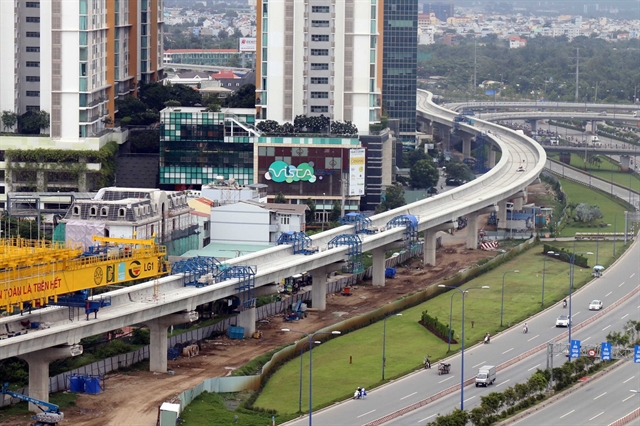 Society
Society


|
| Construction of HCM City’s metro line Nò. 2. — Photo Đầu Tư Online. |
HCM CITY — Lack of funds is the main reason for the slow progress of several major transportation works in HCM City, the city People’s Council heard at a session last week.
Trần Quang Lâm, director of the city Department of Transport, said in the past five years the transport sector has been developing well, contributing significantly to socio-economic development.
The average road area has reached 2.2km per square kilometre of land, and transportation works account for 12.2 per cent of urban construction in terms of area, he said.
But most major works are not completed on schedule, he admitted.
The city has been unable to mobilise an amount of VNĐ372 trillion (over US$16 billion) required for them.
Since 2017 no build - transfer projects have been undertaken due to problems related to paperwork, he said.
The city said it had attracted investments for BOT (build - operate - transfer) projects to upgrade a number of major transport works such as National Highway No 1A, National Highway No 22, Ung Văn Khiêm Street, and Bình Triệu Bridge.
“But these projects have been suspended under the National Assembly’s Decision No 437 [on policies on investment in transportation works],” Lâm said.
The city administration has mapped out major programmes to eliminate the hurdles faced by the city in developing transport infrastructure.
Lâm said these include the issue of Decision No 27 on land acquisition and clearance procedures.
Priority should be given to Belt Road No 2 and No 3 and highways to connect HCM City with provinces in the Southern Focal Economic Zone, and widening National Highway No 1A, No 50, No 22, and No 13, he said.
Public transport must be developed and private vehicles need to be restricted, he said.
Studies in other countries show that even with good infrastructure urban traffic problems could not be solved without efficient management by authorities, he said.
The funds required for transport infrastructure could be raised through land auctions, he said.
The city authorities are also considering collecting fees for the use of infrastructure at ports, he said.
If approved, this could fetch VNĐ3 trillion a year, he estimated.
The money could be used to invest in infrastructure at ports such as Hiệp Phước, Cát Lái and Long Bình in District 9, he added. — VNS




